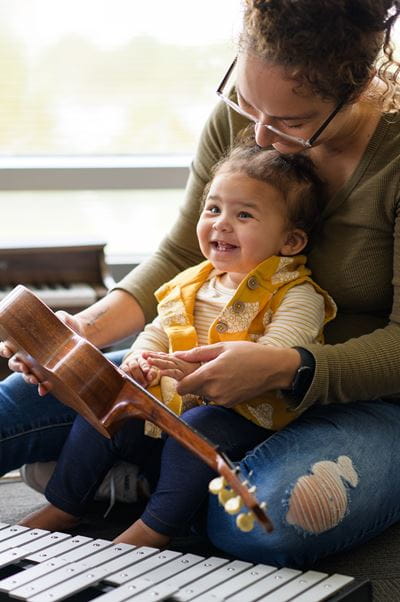For families of young children with blindness-causing conditions, navigating the health care journey in the face of a devastating diagnosis can be overwhelming. With grant funding from the Indiana Department of Health, the IU School of Medicine pediatric ophthalmology division has developed a program to provide clinical care coordination, education and resources to families caring for children with vision loss.
“There is such a need for this kind of help for families,” said pediatric ophthalmologist Charline Boente, MD, who along with fellow pediatric ophthalmologist Kathryn Haider, MD, leads the department’s grant-funded Low Vision Program. “Care coordination for children with blinding eye disease is very complex, and we see time and again that families need education to fully understand the diagnosis, and assistance managing the care that’s required for their child.”
Patients enrolled in the program have a variety of diagnoses. One of the most common is cortical visual impairment (CVI), a condition in which the eyes are healthy, but the part of the brain that processes visual signals is damaged. While there is no cure for this condition, vision can be improved with early intervention and rehabilitation. Other diagnoses include amblyopia (lazy eye), congenital glaucoma, retinopathy of prematurity, cataracts, nystagmus (involuntary rhythmic eye movement) and optic nerve hypoplasia (underdeveloped or absent optic nerve). Jackie DeWeese, RN, joined the Low Vision Program in early 2024 to coordinate care for the nearly 95 patient families currently enrolled in the program. DeWeese, who spent 14 years as a nurse in the neonatal intensive care unit at Riley Children’s Health, has extensive experience working with infants and young children with special medical needs. Awarded to the Department of Ophthalmology in 2023, the two-year, $200,000 Early Intervention for Children with Visual Impairment Grant is designed to support children ages 0 to 3 who are blind or have low vision.
Division launches grant-funded music program for young children

Amira Hurd’s face lights up at the sound of a ukulele, and when her tiny fingers are placed on the strings, she tries to strum it. One-year-old Amira is the first child to participate in a new music program for infants and toddlers who are blind or have low vision. The pediatric ophthalmology division started the program in fall 2024 with grant funding from the Indiana Department of Health.
“It’s often hard for families to find something positive when there’s a diagnosis of congenital blindness,” said pediatric ophthalmologist Kathryn Haider, MD. “Every person needs something that brings them joy an inspires confidence, and we’ve historically seen both children and adults with blindness have an affinity and talent for music.”
Dr. Haider was inspired to start the program after learning about Vision Through Music, an initiative led by the Children’s Eye Foundation of the American Association for Pediatric Ophthalmology and Strabismus and the Academy of Music for the Blind (AMB). The effort aims to increase the number of music instructors who work with children experiencing vision loss. To facilitate the program, the pediatric ophthalmology division is collaborating with Hannah Boehlke, a professionally trained musician from Columbus, Indiana. Currently pursuing certification through AMB, Boehlke is eager to share the benefits of music with children with visual impairment.
“It’s pretty amazing what music can do for brain development in young children — even just listening to music,” Boehlke said. “With Amira and other children with low vision, we’re watching to see if they are drawn to a specific sound.”
During her first session, Amira interacted with a steel drum, a tambourine and a cello, but it was the ukulele that captured her attention. Her parents, Sade Reece and Kareem Hurd, said Amira — diagnosed at 4 months old with Leber congenital amaurosis, a rare eye disorder — has always been captivated by music.
“We’ve noticed that she really seems to love listening to music,” Sade said.
The pediatric ophthalmology division plans to offer the music experience to more families in 2025 and perhaps collaborate with Boehlke to facilitate group sessions.
“I see this helping children like Amira unlock parts of their brain,” Dr. Haider said. “It can bring joy at this young age and instill confidence as they grow older.”
.jpg?rev=853f44cc51d64a0fb48b48fae775c28d&la=en&h=300&w=450&hash=A0893E0B93A2CDA2C4D3B5ED9244D95F)